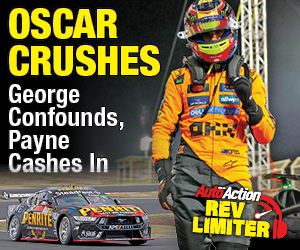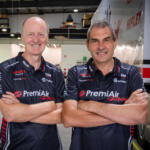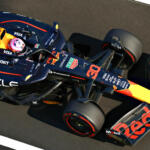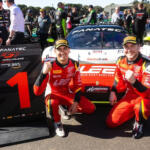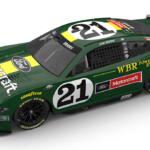Piastri confident after “very small sample size” of success
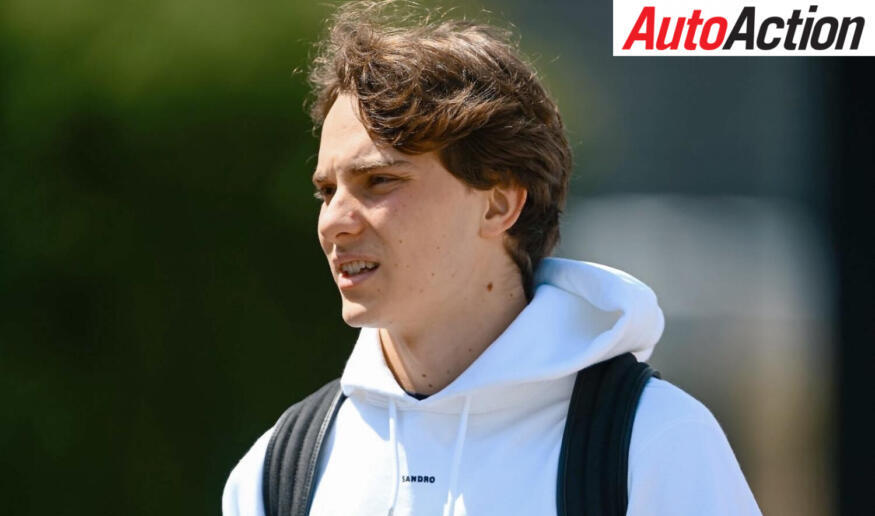
By Reese Mautone
Date posted: 4 April 2025
Carrying strong momentum from a proud victory in Shanghai, a “refined” Oscar Piastri says his priority moving forward is to “maintain that level of performance” while sharpening his focus on his championship ambitions.
Having had a week off to reflect on a successful Chinese Grand Prix which rewarded the #81 with his maiden Pole and third-career victory, Piastri arrives at the Japanese Grand Prix fuelled by confidence and determined to build on that momentum.
“I think the resurfacing [in at the Shanghai International Circuit] changed things a little bit in terms of some of the limitations, but I think in terms of how we prepared for it and how we executed that weekend, it was a very big step up from 2024,” Piastri said.
“So, no, I was very proud of the job, firstly, I did myself, but also the whole team around me did. And, you know, that’s not just as simple as having a more competitive car than we did 12 months ago, I think we did a much better job of maximising the car we had this year.
“Just very proud of that performance and, you know, I think China is quite of a specific circuit in some of the limitations so I don’t think it’s as easy as saying ‘I fixed one of my tricky circuits from last year, I can fix all of them’ — I hope I can — but there’s going to be some different challenges along the way.”
Building confidence in his growing title hopes, the Australian added: “I think Melbourne and China were two very good events — one with the result to show for it and one without, so I’ve been happy with how the whole seasons been going so far.
“You know, there’s been some things in Melbourne that I wanted to work on, the last two years as well, and I felt like I worked on those and was competitive there. And then China, obviously, kind of spoke for itself in terms of the result so, no, very confident with how we’re going about things.
“I think I kind of said in the pre-season this year that I didn’t feel necessarily a hole left in my weaknesses as a driver, it was about just making sure that the kind of ‘dips’ along the way were filled in.
“And I think, obviously, it’s been a very small sample size but I’ve been very happy, especially on one track that I struggled at a lot, you know, the performance was so different 12 months later so, yeah, I think it’s just trying to maintain that level of performance is what’s going to be important.”
While people sing praises for the results that are reflected in the encouraging standings, the Australian says he is most proud of the behind-the-scenes analytics revealed in the post-weekend debriefs.
“I think, for me, you know, just some of the limitations in China are quite specific, especially with how damaging it is to the front tyres,” Piastri said.
“And I had some question marks on, you know, whether it was just a track or, let’s say the tyres behaved in a way that suited me more naturally, but I think after analysing the weekend, I don’t think it was just a pleasant coincidence that it was a strong weekend, I think it was down to a lot of good preparation.
“Analysing that weekend gave me probably even more confidence than what I gained during the weekend — or added more on top of that, so that’s always a really positive thing when you look back at things and feel like they’re not just been things that have gone in your favour or been lucky with.
“They’ve been good for a reason or a number of reasons, that was a really satisfying conclusion from China that wasn’t necessarily from the result.”

After outscoring Lando Norris in both the Sprint and main event, the Australian now sits with 24 points to his name, ten points behind the championship-leading McLaren driver.
Filling the space between the teammates, both Max Verstappen and George Russell have capitalised despite the MCL39 appearing to be the quickest challenger, with Piastri looking to make some amendments to the order after the Japanese Grand Prix.
“You never want to give any advantage away, whether it’s lap time, points, you never want to give it away if you don’t have to,” Piastri said.
“Of course, I want to try and reverse that gap that we have, but with 22 races to go, it would be a pretty stressful year if you were worrying about that gap already.
“So I think for me, it’s trying to make sure I execute every weekend to the best that I can, and I feel the first two weekends of the year, have been good examples of that, and I think if you do that, then the point will naturally just take care of itself, so yeah, that’s all.”
Locking in on his championship charge, Piastri’s race-by-race mentality is holding strong despite the Australian’s acknowledgement of how periodical dominance can shape the title fight.
“I think, for me, yes, they (championships) can be won and lost at the start of the year but they can also be won and lost at the end of the year,” he said.
“You know, the first six races are just as important as the last six, but obviously, the last six, you get a much better picture of where everyone sits and stuff like that.
“I’ve had plenty of championships myself where you look at the gaps and where you’ve lost points and stuff like that and you generally don’t really look at where in the year they came.
“You just look at the fact that you did have points that you lost through the season at some point.”
The start of Oscar Piastri’s Japanese Grand Prix campaign will kick off with FP1 at 13:30 AEDT, with the weekend returning to a conventional format for Round 3 of the 2025 Formula 1 season.
Image: McLaren
Read the new issue of Auto Action Digital HERE
Don’t forget the print edition of Auto Action available via subscription here or you can purchase a copy of the latest issue from one of our outlets here. For more of the latest motorsport news, subscribe to AUTO ACTION magazine.
Recent Stories
array (
0 =>
WP_Term::__set_state(array(
'term_id' => 37,
'name' => 'F1',
'slug' => 'f1',
'term_group' => 0,
'term_taxonomy_id' => 37,
'taxonomy' => 'category',
'description' => 'An Introduction to Formula One (F1)
Formula One, or F1, is the highest class of single-seater auto racing, governed by the Fédération Internationale de l\'Automobile (FIA) and is owned by Liberty Media. The name "Formula One" refers to the set of rules or formula that all cars and drivers must comply with.
The F1 season consists of a series of races, known as Grands Prix, held on purpose-built circuits or public roads around the world. The results of each race are combined to determine two annual championships: one for drivers and one for constructors (teams).
The history of Formula One can be traced back to the pre-war Grand Prix racing, which featured open-wheel cars with supercharged engines. The first World Championship of Drivers was organised by the FIA in 1950, following the end of World War II. The first race was held at Silverstone, England, and was won by Giuseppe Farina, driving an Alfa Romeo. The first constructors\' championship was introduced in 1958 and was won by Vanwall.
Formula One has seen many changes and innovations over the years, both in terms of technology and regulations. Some of the most notable developments include the introduction of rear-engined cars in the late 1950s, the use of aerodynamic wings in the late 1960s, the adoption of turbocharged engines in the late 1970s, the emergence of electronic driver aids in the late 1980s, the switch to V10 and then V8 engines in the 1990s and 2000s, and the introduction of hybrid power units in 2014.
Formula One has also produced some of the greatest drivers and rivalries in the history of motorsport. Some of the most famous names include Juan Manuel Fangio, Jim Clark, Jackie Stewart, Niki Lauda, Ayrton Senna, Alain Prost, Michael Schumacher, Lewis Hamilton, and Sebastian Vettel. Some of the most intense battles for the championship have been between Fangio and Stirling Moss in the 1950s, Lauda and James Hunt in the 1970s, Senna and Prost in the late 1980s, Schumacher and Mika Hakkinen in the late 1990s, and Hamilton and Vettel in the 2010s.
Formula One is widely regarded as the pinnacle of motorsport, attracting millions of fans and viewers worldwide. The sport is also a huge business, involving billions of dollars in revenue and expenditure. The teams compete for prize money, sponsorship deals, and media rights, while the drivers earn millions of dollars in salaries and endorsements. The sport is also influenced by politics, regulations, and controversies, such as doping scandals, espionage cases, safety issues, and environmental concerns.
The following is a list of all F1 World Drivers Champions by year, from 1950 to 2020:
1950-1959
1950: Giuseppe Farina (Italy) - Alfa Romeo 158, Alfa Romeo
1951: Juan Manuel Fangio (Argentina) - Alfa Romeo 159, Alfa Romeo
1952: Alberto Ascari (Italy) - Ferrari 500, Ferrari
1953: Alberto Ascari (Italy) - Ferrari 500, Ferrari
1954: Juan Manuel Fangio (Argentina) - Maserati 250F, Maserati / Mercedes-Benz W196, Mercedes-Benz
1955: Juan Manuel Fangio (Argentina) - Mercedes-Benz W196, Mercedes-Benz
1956: Juan Manuel Fangio (Argentina) - Ferrari D50, Ferrari
1957: Juan Manuel Fangio (Argentina) - Maserati 250F, Maserati
1958: Mike Hawthorn (United Kingdom) - Ferrari 246, Ferrari
1959: Jack Brabham (Australia) - Cooper T51, Cooper-Climax
1960-1969
1960: Jack Brabham (Australia) - Cooper T53, Cooper-Climax
1961: Phil Hill (United States) - Ferrari 156, Ferrari
1962: Graham Hill (United Kingdom) - BRM P57, BRM
1963: Jim Clark (United Kingdom) - Lotus 25, Lotus-Climax
1964: John Surtees (United Kingdom) - Ferrari 158, Ferrari
1965: Jim Clark (United Kingdom) - Lotus 33, Lotus-Climax
1966: Jack Brabham (Australia) - Brabham BT19, Brabham-Repco
1967: Denny Hulme (New Zealand) - Brabham BT20, Brabham-Repco
1968: Graham Hill (United Kingdom) - Lotus 49, Lotus-Ford
1969: Jackie Stewart (United Kingdom) - Matra MS80, Matra-Ford
1970-1979
1970: Jochen Rindt (Austria) - Lotus 72, Lotus-Ford
1971: Jackie Stewart (United Kingdom) - Tyrrell 003, Tyrrell-Ford
1972: Emerson Fittipaldi (Brazil) - Lotus 72D, Lotus-Ford
1973: Jackie Stewart (United Kingdom) - Tyrrell 006, Tyrrell-Ford
1974: Emerson Fittipaldi (Brazil) - McLaren M23, McLaren-Ford
1975: Niki Lauda (Austria) - Ferrari 312T, Ferrari
1976: James Hunt (United Kingdom) - McLaren M23, McLaren-Ford
1977: Niki Lauda (Austria) - Ferrari 312T2, Ferrari
1978: Mario Andretti (United States) - Lotus 79, Lotus-Ford
1979: Jody Scheckter (South Africa) - Ferrari 312T4, Ferrari
1980-1989
1980: Alan Jones (Australia) - Williams FW07B, Williams-Ford
1981: Nelson Piquet (Brazil) - Brabham BT49C, Brabham-Ford
1982: Keke Rosberg (Finland) - Williams FW08, Williams-Ford
1983: Nelson Piquet (Brazil) - Brabham BT52, Brabham-BMW
1984: Niki Lauda (Austria) - McLaren MP4/2, McLaren-TAG
1985: Alain Prost (France) - McLaren MP4/2B, McLaren-TAG
1986: Alain Prost (France) - McLaren MP4/2C, McLaren-TAG
1987: Nelson Piquet (Brazil) - Williams FW11B, Williams-Honda
1988: Ayrton Senna (Brazil) - McLaren MP4/4, McLaren-Honda
1989: Alain Prost (France) - McLaren MP4/5, McLaren-Honda
1990-1999
1990: Ayrton Senna (Brazil) - McLaren MP4/5B, McLaren-Honda
1991: Ayrton Senna (Brazil) - McLaren MP4/6, McLaren-Honda
1992: Nigel Mansell (United Kingdom) - Williams FW14B, Williams-Renault
1993: Alain Prost (France) - Williams FW15C, Williams-Renault
1994: Michael Schumacher (Germany) - Benetton B194, Benetton-Ford
1995: Michael Schumacher (Germany) - Benetton B195, Benetton-Renault
1996: Damon Hill (United Kingdom) - Williams FW18, Williams-Renault
1997: Jacques Villeneuve (Canada) - Williams FW19, Williams-Renault
1998: Mika Häkkinen (Finland) - McLaren MP4/13, McLaren-Mercedes
1999: Mika Häkkinen (Finland) - McLaren MP4/14, McLaren-Mercedes
2000-2009
2000: Michael Schumacher (Germany) - Ferrari F1-2000, Ferrari
2001: Michael Schumacher (Germany) - Ferrari F2001, Ferrari
2002: Michael Schumacher (Germany) - Ferrari F2002, Ferrari
2003: Michael Schumacher (Germany) - Ferrari F2003-GA, Ferrari
2004: Michael Schumacher (Germany) - Ferrari F2004, Ferrari
2005: Fernando Alonso (Spain) - Renault R25, Renault
2006: Fernando Alonso (Spain) - Renault R26, Renault
2007: Kimi Räikkönen (Finland) - Ferrari F2007, Ferrari
2008: Lewis Hamilton (United Kingdom) - McLaren MP4-23, McLaren-Mercedes
2009: Jenson Button (United Kingdom) - Brawn BGP 001, Brawn-Mercedes
2010-2020
2010: Sebastian Vettel (Germany) - Red Bull RB6, Red Bull-Renault
2011: Sebastian Vettel (Germany) - Red Bull RB7, Red Bull-Renault
2012: Sebastian Vettel (Germany) - Red Bull RB8, Red Bull-Renault
2013: Sebastian Vettel (Germany) - Red Bull RB9, Red Bull-Renault
2014: Lewis Hamilton (United Kingdom) - Mercedes F1 W05 Hybrid, Mercedes
2015: Lewis Hamilton (United Kingdom) - Mercedes F1 W06 Hybrid, Mercedes
2016: Nico Rosberg (Germany) - Mercedes F1 W07 Hybrid, Mercedes
2017: Lewis Hamilton (United Kingdom) - Mercedes F1 W08 EQ Power+, Mercedes
2018: Lewis Hamilton (United Kingdom) - Mercedes F1 W09 EQ Power+, Mercedes
2019: Lewis Hamilton (United Kingdom) - Mercedes F1 W10 EQ Power+, Mercedes
2020: Lewis Hamilton (United Kingdom) - Mercedes F1 W11 EQ Power+, Mercedes
2021-
2021: Max Verstappen (Netherlands) – Red Bull RB16B, Honda
2022: Max Verstappen (Netherlands) – Red Bull RB18, Red Bull Power Trains Honda
2023: Max Verstappen (Netherlands) – Red Bull RB19, Red Bull Power Trains Honda
2024: Max Verstappen (Netherlands) – Red Bull RB20, Red Bull Power Trains Honda',
'parent' => 660,
'count' => 2621,
'filter' => 'raw',
'cat_ID' => 37,
'category_count' => 2621,
'category_description' => 'An Introduction to Formula One (F1)
Formula One, or F1, is the highest class of single-seater auto racing, governed by the Fédération Internationale de l\'Automobile (FIA) and is owned by Liberty Media. The name "Formula One" refers to the set of rules or formula that all cars and drivers must comply with.
The F1 season consists of a series of races, known as Grands Prix, held on purpose-built circuits or public roads around the world. The results of each race are combined to determine two annual championships: one for drivers and one for constructors (teams).
The history of Formula One can be traced back to the pre-war Grand Prix racing, which featured open-wheel cars with supercharged engines. The first World Championship of Drivers was organised by the FIA in 1950, following the end of World War II. The first race was held at Silverstone, England, and was won by Giuseppe Farina, driving an Alfa Romeo. The first constructors\' championship was introduced in 1958 and was won by Vanwall.
Formula One has seen many changes and innovations over the years, both in terms of technology and regulations. Some of the most notable developments include the introduction of rear-engined cars in the late 1950s, the use of aerodynamic wings in the late 1960s, the adoption of turbocharged engines in the late 1970s, the emergence of electronic driver aids in the late 1980s, the switch to V10 and then V8 engines in the 1990s and 2000s, and the introduction of hybrid power units in 2014.
Formula One has also produced some of the greatest drivers and rivalries in the history of motorsport. Some of the most famous names include Juan Manuel Fangio, Jim Clark, Jackie Stewart, Niki Lauda, Ayrton Senna, Alain Prost, Michael Schumacher, Lewis Hamilton, and Sebastian Vettel. Some of the most intense battles for the championship have been between Fangio and Stirling Moss in the 1950s, Lauda and James Hunt in the 1970s, Senna and Prost in the late 1980s, Schumacher and Mika Hakkinen in the late 1990s, and Hamilton and Vettel in the 2010s.
Formula One is widely regarded as the pinnacle of motorsport, attracting millions of fans and viewers worldwide. The sport is also a huge business, involving billions of dollars in revenue and expenditure. The teams compete for prize money, sponsorship deals, and media rights, while the drivers earn millions of dollars in salaries and endorsements. The sport is also influenced by politics, regulations, and controversies, such as doping scandals, espionage cases, safety issues, and environmental concerns.
The following is a list of all F1 World Drivers Champions by year, from 1950 to 2020:
1950-1959
1950: Giuseppe Farina (Italy) - Alfa Romeo 158, Alfa Romeo
1951: Juan Manuel Fangio (Argentina) - Alfa Romeo 159, Alfa Romeo
1952: Alberto Ascari (Italy) - Ferrari 500, Ferrari
1953: Alberto Ascari (Italy) - Ferrari 500, Ferrari
1954: Juan Manuel Fangio (Argentina) - Maserati 250F, Maserati / Mercedes-Benz W196, Mercedes-Benz
1955: Juan Manuel Fangio (Argentina) - Mercedes-Benz W196, Mercedes-Benz
1956: Juan Manuel Fangio (Argentina) - Ferrari D50, Ferrari
1957: Juan Manuel Fangio (Argentina) - Maserati 250F, Maserati
1958: Mike Hawthorn (United Kingdom) - Ferrari 246, Ferrari
1959: Jack Brabham (Australia) - Cooper T51, Cooper-Climax
1960-1969
1960: Jack Brabham (Australia) - Cooper T53, Cooper-Climax
1961: Phil Hill (United States) - Ferrari 156, Ferrari
1962: Graham Hill (United Kingdom) - BRM P57, BRM
1963: Jim Clark (United Kingdom) - Lotus 25, Lotus-Climax
1964: John Surtees (United Kingdom) - Ferrari 158, Ferrari
1965: Jim Clark (United Kingdom) - Lotus 33, Lotus-Climax
1966: Jack Brabham (Australia) - Brabham BT19, Brabham-Repco
1967: Denny Hulme (New Zealand) - Brabham BT20, Brabham-Repco
1968: Graham Hill (United Kingdom) - Lotus 49, Lotus-Ford
1969: Jackie Stewart (United Kingdom) - Matra MS80, Matra-Ford
1970-1979
1970: Jochen Rindt (Austria) - Lotus 72, Lotus-Ford
1971: Jackie Stewart (United Kingdom) - Tyrrell 003, Tyrrell-Ford
1972: Emerson Fittipaldi (Brazil) - Lotus 72D, Lotus-Ford
1973: Jackie Stewart (United Kingdom) - Tyrrell 006, Tyrrell-Ford
1974: Emerson Fittipaldi (Brazil) - McLaren M23, McLaren-Ford
1975: Niki Lauda (Austria) - Ferrari 312T, Ferrari
1976: James Hunt (United Kingdom) - McLaren M23, McLaren-Ford
1977: Niki Lauda (Austria) - Ferrari 312T2, Ferrari
1978: Mario Andretti (United States) - Lotus 79, Lotus-Ford
1979: Jody Scheckter (South Africa) - Ferrari 312T4, Ferrari
1980-1989
1980: Alan Jones (Australia) - Williams FW07B, Williams-Ford
1981: Nelson Piquet (Brazil) - Brabham BT49C, Brabham-Ford
1982: Keke Rosberg (Finland) - Williams FW08, Williams-Ford
1983: Nelson Piquet (Brazil) - Brabham BT52, Brabham-BMW
1984: Niki Lauda (Austria) - McLaren MP4/2, McLaren-TAG
1985: Alain Prost (France) - McLaren MP4/2B, McLaren-TAG
1986: Alain Prost (France) - McLaren MP4/2C, McLaren-TAG
1987: Nelson Piquet (Brazil) - Williams FW11B, Williams-Honda
1988: Ayrton Senna (Brazil) - McLaren MP4/4, McLaren-Honda
1989: Alain Prost (France) - McLaren MP4/5, McLaren-Honda
1990-1999
1990: Ayrton Senna (Brazil) - McLaren MP4/5B, McLaren-Honda
1991: Ayrton Senna (Brazil) - McLaren MP4/6, McLaren-Honda
1992: Nigel Mansell (United Kingdom) - Williams FW14B, Williams-Renault
1993: Alain Prost (France) - Williams FW15C, Williams-Renault
1994: Michael Schumacher (Germany) - Benetton B194, Benetton-Ford
1995: Michael Schumacher (Germany) - Benetton B195, Benetton-Renault
1996: Damon Hill (United Kingdom) - Williams FW18, Williams-Renault
1997: Jacques Villeneuve (Canada) - Williams FW19, Williams-Renault
1998: Mika Häkkinen (Finland) - McLaren MP4/13, McLaren-Mercedes
1999: Mika Häkkinen (Finland) - McLaren MP4/14, McLaren-Mercedes
2000-2009
2000: Michael Schumacher (Germany) - Ferrari F1-2000, Ferrari
2001: Michael Schumacher (Germany) - Ferrari F2001, Ferrari
2002: Michael Schumacher (Germany) - Ferrari F2002, Ferrari
2003: Michael Schumacher (Germany) - Ferrari F2003-GA, Ferrari
2004: Michael Schumacher (Germany) - Ferrari F2004, Ferrari
2005: Fernando Alonso (Spain) - Renault R25, Renault
2006: Fernando Alonso (Spain) - Renault R26, Renault
2007: Kimi Räikkönen (Finland) - Ferrari F2007, Ferrari
2008: Lewis Hamilton (United Kingdom) - McLaren MP4-23, McLaren-Mercedes
2009: Jenson Button (United Kingdom) - Brawn BGP 001, Brawn-Mercedes
2010-2020
2010: Sebastian Vettel (Germany) - Red Bull RB6, Red Bull-Renault
2011: Sebastian Vettel (Germany) - Red Bull RB7, Red Bull-Renault
2012: Sebastian Vettel (Germany) - Red Bull RB8, Red Bull-Renault
2013: Sebastian Vettel (Germany) - Red Bull RB9, Red Bull-Renault
2014: Lewis Hamilton (United Kingdom) - Mercedes F1 W05 Hybrid, Mercedes
2015: Lewis Hamilton (United Kingdom) - Mercedes F1 W06 Hybrid, Mercedes
2016: Nico Rosberg (Germany) - Mercedes F1 W07 Hybrid, Mercedes
2017: Lewis Hamilton (United Kingdom) - Mercedes F1 W08 EQ Power+, Mercedes
2018: Lewis Hamilton (United Kingdom) - Mercedes F1 W09 EQ Power+, Mercedes
2019: Lewis Hamilton (United Kingdom) - Mercedes F1 W10 EQ Power+, Mercedes
2020: Lewis Hamilton (United Kingdom) - Mercedes F1 W11 EQ Power+, Mercedes
2021-
2021: Max Verstappen (Netherlands) – Red Bull RB16B, Honda
2022: Max Verstappen (Netherlands) – Red Bull RB18, Red Bull Power Trains Honda
2023: Max Verstappen (Netherlands) – Red Bull RB19, Red Bull Power Trains Honda
2024: Max Verstappen (Netherlands) – Red Bull RB20, Red Bull Power Trains Honda',
'cat_name' => 'F1',
'category_nicename' => 'f1',
'category_parent' => 660,
)),
1 =>
WP_Term::__set_state(array(
'term_id' => 11,
'name' => 'Latest News',
'slug' => 'latest-news',
'term_group' => 0,
'term_taxonomy_id' => 11,
'taxonomy' => 'category',
'description' => '',
'parent' => 0,
'count' => 15838,
'filter' => 'raw',
'cat_ID' => 11,
'category_count' => 15838,
'category_description' => '',
'cat_name' => 'Latest News',
'category_nicename' => 'latest-news',
'category_parent' => 0,
)),
2 =>
WP_Term::__set_state(array(
'term_id' => 2029,
'name' => 'ZZZ-Email',
'slug' => 'email',
'term_group' => 0,
'term_taxonomy_id' => 2029,
'taxonomy' => 'category',
'description' => '',
'parent' => 2031,
'count' => 6413,
'filter' => 'raw',
'cat_ID' => 2029,
'category_count' => 6413,
'category_description' => '',
'cat_name' => 'ZZZ-Email',
'category_nicename' => 'email',
'category_parent' => 2031,
)),
3 =>
WP_Term::__set_state(array(
'term_id' => 2031,
'name' => 'ZZZ-RSSFeeds',
'slug' => 'zzz-rssfeeds',
'term_group' => 0,
'term_taxonomy_id' => 2031,
'taxonomy' => 'category',
'description' => '',
'parent' => 0,
'count' => 5767,
'filter' => 'raw',
'cat_ID' => 2031,
'category_count' => 5767,
'category_description' => '',
'cat_name' => 'ZZZ-RSSFeeds',
'category_nicename' => 'zzz-rssfeeds',
'category_parent' => 0,
)),
)

